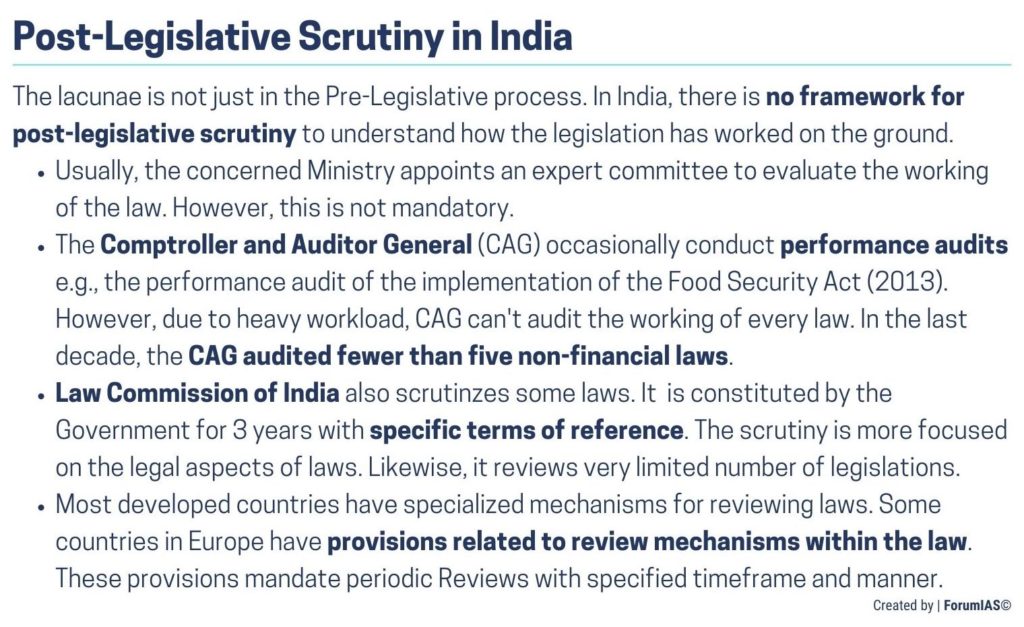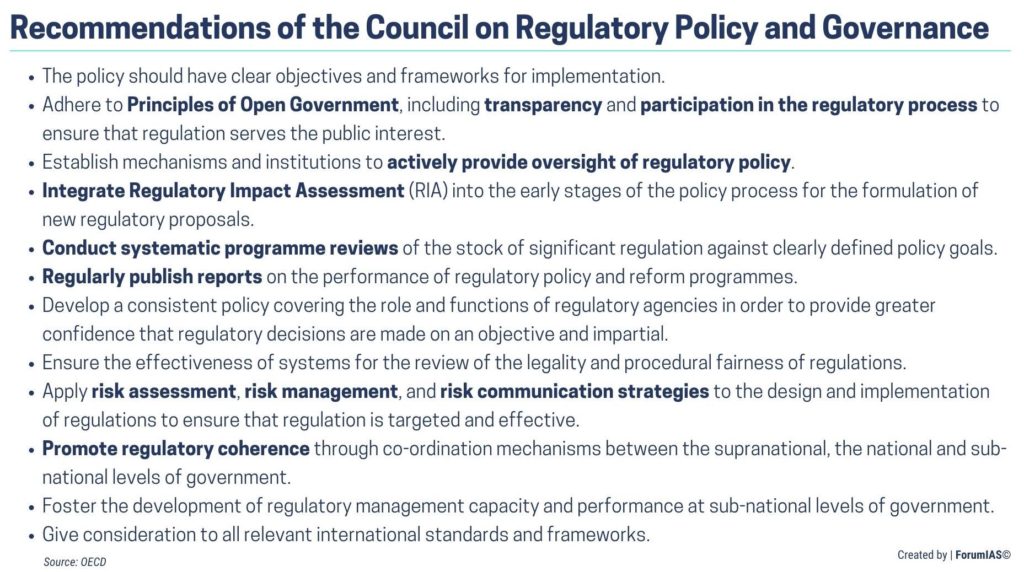ForumIAS announcing GS Foundation Program for UPSC CSE 2025-26 from 19 April. Click Here for more information.
Contents
| For 7PM Editorial Archives click HERE → |
Introduction
Pre-legislative Consultation is a process where a Bill is properly scrutinized by all stakeholders prior to its enactment, to assess its Constitutionality and rights-compliance. The purpose is to enhance accountability of the Government leading to better policy formulation. The 17th Lok Sabha has passed about 150 Bills in less than 3 years of its existence. On an average, 15 Bills have been passed in each session. In contrast, the 16th Lok Sabha had passed 133 Bills in its entire 5-year duration. While the productivity of the Lok Sabha can be applauded, the speed has come at the cost of debate and deliberation; the two core ideas of democracy that the Parliament stands for. This suggests that the current the Pre-legislative Consultation framework in India requires a relook.
What is the current Pre-legislative Consultation Framework in India?
Consultation: In 2014, the Ministry of Law and Justice issued a Pre-Legislative Consultation Policy (PLCP).
Under the Policy, the Union Government is required to place legislative proposals (Bills, Rules, Regulations etc.) in the public domain for a period of at least 30 days before they were submitted to the Cabinet for consideration.
Each such draft proposal must be accompanied by a brief note: (a) Justifying its necessity; (b) Financial implications; (c) Impact on the environment; (d) Impact on the Fundamental Rights of the people; (e) The social and financial costs of the Bill.
Comments received from the public need to be summarized and placed on the website of the Department or the Ministry concerned. These also need to be included in a note to the Cabinet along with the draft proposal.
Scrutiny by Parliament: Bills go through varying levels of discussions and scrutiny in the Legislature. When a Bill is introduced in a House of the Parliament the Presiding Officer can refer it to the appropriate Parliamentary Committee. The Parliamentary Committee deliberates the Bill in detail e.g., the Parliament took 5 years to examine the Bill to regulate surrogacy before passing it in 2021. However, the process is by-passed many times because the scrutiny is not mandatory e.g., the Constitution Amendment Bill to enable 10% reservation in education and employment for Economically Weaker Sections was passed by the Parliament in just 2 days. The Presiding Officers of either House didn’t send it for scrutiny.
In the 16th Lok Sabha (2014-19), only 25% of the Bills introduced were referred to Committees. In contrast, 71% and 60% of the Bills were examined by Committees during 15th (2009-14) and 14th (2004-09) Lok Sabhas, respectively.
What is the need to strengthen the Pre-Legislative Consultation Framework?
Non Obligatory Nature of the Current System: It is not obligatory for the Government to adhere to the established procedures. In the current Lok Sabha (17th), less than 20% of the introduced Bills have been referred to Parliamentary Committees (till September 2020). Since the introduction of the 2014 Pre-Legislative Consultation Policy, 227 of the 301 Bills (75%) introduced in Parliament have been presented without any prior consultation. Of the 74 placed in the public domain for comments, at least 40 did not adhere to the 30-day deadline.
Further, the Government is under no obligation to justify why a given suggestion was excluded from the final draft.
Improving efficiency of legislations: An effective Pre-Legislative Consultation Framework will ensure that any law or scheme must be based on the principle that its benefits outweigh the costs. It will also ensure that among the various alternatives available, the chosen one confers maximum net benefits.
Better Policy Formulation: People engagement would get enhanced if the Pre-Legislative Consultation Framework is strengthened. People engagement will result in greater acceptability and better policy formulation. Direct consultation with general public democratizes access to Constitutional Rights and values. For instance, the Right to Information Act is seen as a landmark legislation when highlighting the role of civil society actors in the drafting of a Bill.
Augmenting Trust in the Legislature: A robust framework will result in improving the transparency and accountability in the legislative process thereby enhancing trust of the masses in legislature.
Prevent Dominance of the Executive: The Executive is an integral part of the Legislature, and when coupled with the anti-defection law, it assumes unfettered control over the Legislature. In such a scenario an effective Pre-Legislative Consultation Framework is desired to control its dominance and ensure accountability to the Legislature.
Overcoming the limitations of the Judiciary: Pre-Legislative Consultation will help in better formulation of laws and address concerns of all stakeholders. This will reduce litigation post the passage of laws. The Chief Justice of India recently remarked that poorly drafted laws result in lot of ambiguities leading to litigation and undue burden on the Judiciary.
This will also address the concerns regarding Judicial over-reach to an extent. The expansion of the scope of review by an unelected Judiciary raises concerns regarding Constitutional and democratic legitimacy.
What is the proposed Legislation and Expenditure Accountability Bill, 2022?
The Bill has been introduced as a Private Member’s Bill in April 2022 in the Rajya Sabha. It is based on the Organization for Economic Cooperation and Development (OECD) recommendations on policy-making practices. The Bill goes two steps further than the 2014 Pre-legislative Consultation Policy.
First, it is a Bill, which means that if it becomes an Act, it will be legally binding on the Government.
Second, it adds the dimension of a post-legislative check with fail-safe mechanisms.
The specifics of the bill revolve around two technical assessments: a Legislation Impact Analysis or LIA (and correspondingly, a scheme impact analysis for public schemes) and a Post-Implementation Assessment (PIA) report.
The LIA report must offer an assessment of potential costs and benefits to society, the objectives of the intervention with clear measurable outcomes, and the experience of other countries, among other things.
The PIA has three aspects: (a) Performance measurement, which evaluates schemes and laws against the objectives defined in the LIA; (b) Impact assessment, which evaluates qualitative aspects like social, environmental and legal effects and spillovers; (c) Perception surveys that measure people’s satisfaction.
The Bill requires laws and schemes to have expiry dates (sunset clauses). Such a provision would grant the Legislature an opportunity to re-make laws and schemes, thus ensuring that the nation stays up to date on the evolving dynamics of the world. Moreover, if a law or scheme fails its PIA test in three consecutive reviews, it would automatically be repealed.
Recommendations of OECD’s Council on Regulatory Policy and Governance, 2012
What can be done going ahead?
First, the proposed 2022 Bill demands considerable effort by the Executive to undertake proper evaluations of schemes and legislative moves. It can lay the groundwork for a new institutional mechanism to ensure self-probity in public expenditure and law-making.
Second, the media should do constructive reporting of legislative functioning and enlighten the masses about the probable impacts of a proposed legislation on their rights and interests. Along with this, civil society groups can support the stakeholders for raising their voice in a structured and impactful way.
Third, the impacted stakeholders of any legislative Bill need to sideline their rigid opinions and ideologies in order to build consensus with fellow stakeholders and the Government. They need to realize that policy-making is an exercise in compromise and that nobody can expect to get their way every time.
Fourth, the Government (Executive) has to be mindful of the established procedures and practices. Proper scrutiny by Parliamentary Committees can address loopholes in the proposed legislations and reduce the possibility of subsequent backlash (as happened with the Farm Laws). So the process should not be by-passed. Pre-legislative Consultation can be made mandatory for all Bills, along with exceptions in case the Government feels that urgent legislation is required to address a particular issue.
Fifth, The Rules of Procedure and Conduct of Business in the Lok Sabha/Rajya Sabha can be amended. If the Government does not accept the recommendations of a Standing/Select Committee, then the Minister in charge of the Bill must submit a memorandum to Parliament explaining the reasons for rejecting such recommendations.
Conclusion
The Government needs to strengthen the Pre-Legislative Consultation Framework in order to improve transparency and accountability of the legislative process. This is needed to enhance the Constitutional culture in India under which masses believe that the exercise of State power is limited by the Constitution.
Source: Mint, Mint, Indian Express, The Hindu, The Leaflet






